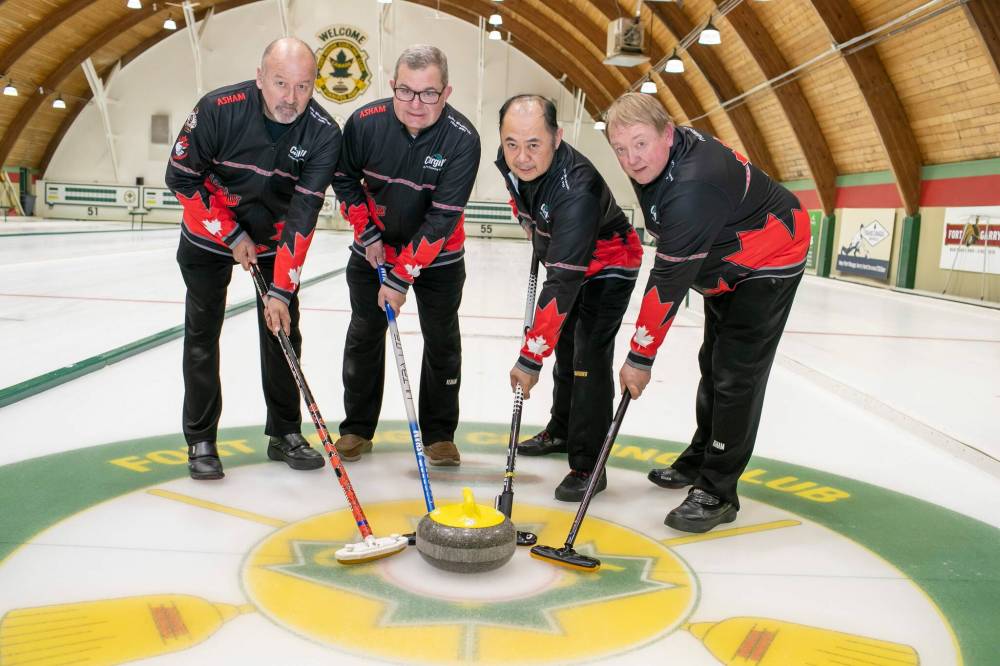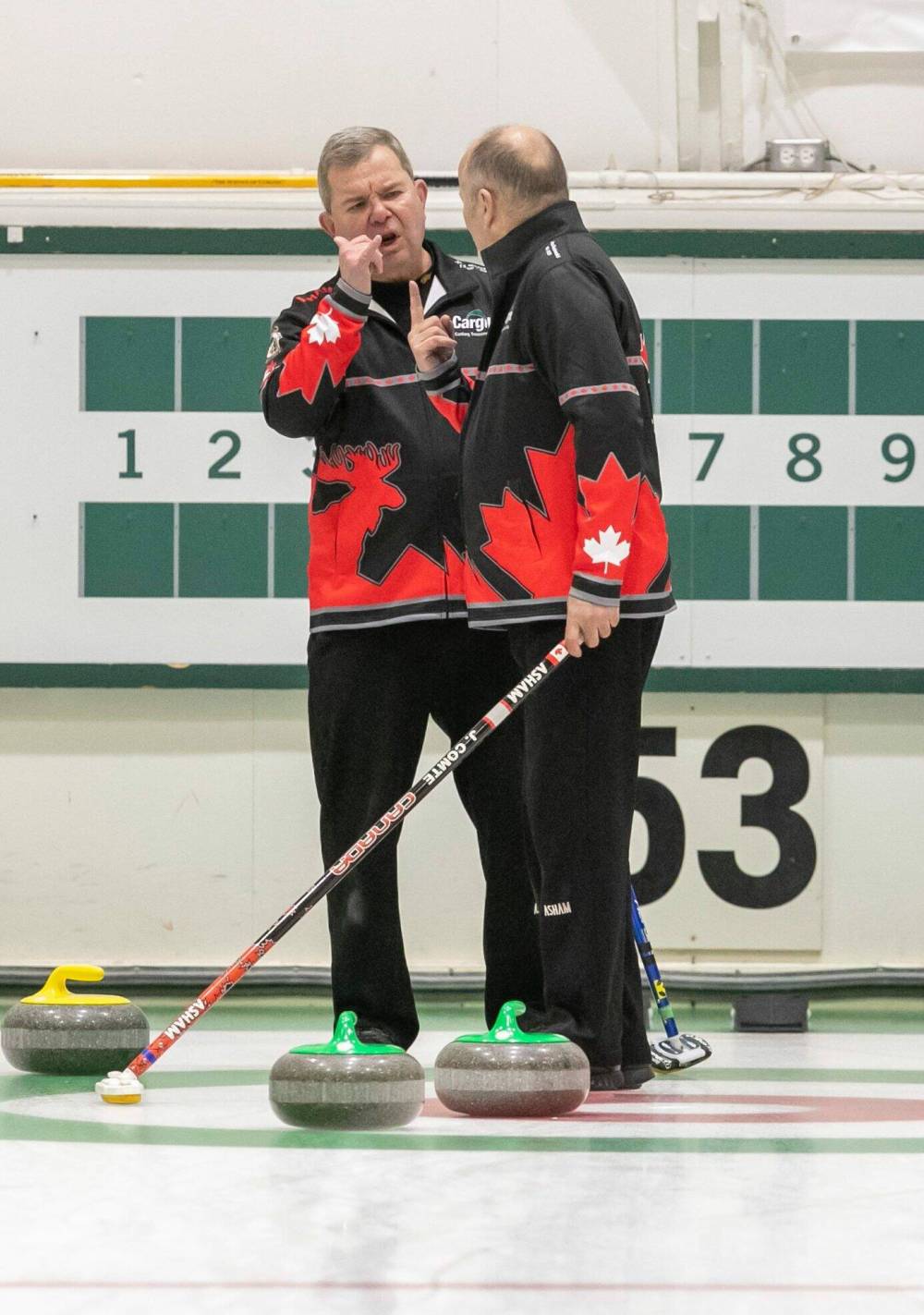Quietly going about their business Team Kluchnik uses Manitoba Open to prepare for World Deaf Curling Championships
Read this article for free:
or
Already have an account? Log in here »
To continue reading, please subscribe:
Monthly Digital Subscription
$1 per week for 24 weeks*
- Enjoy unlimited reading on winnipegfreepress.com
- Read the E-Edition, our digital replica newspaper
- Access News Break, our award-winning app
- Play interactive puzzles
*Billed as $4.00 plus GST every four weeks. After 24 weeks, price increases to the regular rate of $19.95 plus GST every four weeks. Offer available to new and qualified returning subscribers only. Cancel any time.
Monthly Digital Subscription
$4.99/week*
- Enjoy unlimited reading on winnipegfreepress.com
- Read the E-Edition, our digital replica newspaper
- Access News Break, our award-winning app
- Play interactive puzzles
*Billed as $19.95 plus GST every four weeks. Cancel any time.
To continue reading, please subscribe:
Add Free Press access to your Brandon Sun subscription for only an additional
$1 for the first 4 weeks*
*Your next subscription payment will increase by $1.00 and you will be charged $16.99 plus GST for four weeks. After four weeks, your payment will increase to $23.99 plus GST every four weeks.
Read unlimited articles for free today:
or
Already have an account? Log in here »
Hey there, time traveller!
This article was published 17/01/2025 (409 days ago), so information in it may no longer be current.
As the 137th edition of the Manitoba Open bonspiel began Thursday at Fort Rouge Curling Club, not every team shouted “hurry hard.”
One of the tournament’s oldest entrees, the Winnipeg-based Team Kluchnik was using American Sign Language and other visual cues to communicate as they guided their stones down the pebbled ice.
Skip Joe Comte, third Bill Kluchnik and second Frank Chung were all born deaf, while lead Cam Hurst lost most of his hearing five years ago.
They make up one of the two deaf teams in the latest iteration of the world’s largest bonspiel, which goes through the weekend and concludes Monday. Ross LaVallee, Brian Broszeit, Shawna Demianyk and John Gessner make up the other.
BROOK JONES/FREE PRESS From left: Joe Comte, Bill Kluchnik, Frank Chung and lead Cam Hurst, will be competing at the 2025 World Deaf Curling Championships in Minneapolis.
Team Kluchnik, which comprises masters-level players, might be quiet by nature, but make no mistake, its play is loud.
“We’re very competitive, and we have been competitive, and it’s when we’re going on to play in national championships then that competitiveness ramps up,” Hurst said.
As 256 teams vie for one of three invitations to the Viterra men’s provincial championship, Team Kluchnik is using this week to prepare for a bigger event on its calendar.
After winning the 2023 Canadian Deaf Championship, the team was set to represent Canada at the 2024 Winter Deaflympics in Turkey until the country was deemed unsafe for visiting athletes and the event was cancelled.
To make up for their missed opportunity, the Manitobans will wear the Maple Leaf at the upcoming World Deaf Curling Championships in Minneapolis in April. While Comte, Kluchnik and Chung have all previously curled on the international stage, the opportunity is particularly special to Hurst, who will experience it for the only time in his life.
Hurst has trained year-round for the last five years for the chance to represent his country, which he called a bucket-list experience. The 60-year-old said he plans to step away from the team to instruct younger curlers after the world event.
BROOK JONES / FREE PRESS The team formed at the Heather Curling Club in 2019.
“I am trying to bring more awareness to deaf curling than what exists in this province, and that if there’s anyone that wants to get into the high-performance levels, that it is possible,” he said.
The team formed at the Heather Curling Club in 2019, when Hurst joined Comte, Kluchnik and then-second Brian Weselowski. Chung, who lives in Vancouver, met the team at a national tournament while playing for British Columbia’s provincial team and agreed to serve as the alternate.
Following Weselowski’s death last year, Chung stepped into a full-time role as the team’s second and flies to Winnipeg about five times a year for bonspiels. Weselowski’s name is embroidered on the team’s jerseys in his honour.
Hurst admitted there were some hurdles to overcome early on. The most prevalent of which was communicating with his teammates because he didn’t know ASL.
“That’s been a challenge, but they’re good and they taught me and it’s fine,” Hurst said. “The team is positive because we all want to win a national championship. We’re all older, so we have experience.”
There are 16 curlers registered with the Manitoba Deaf Sports Association. Chris Hamblin has operated as the coach for Team Kluchnik along with her husband Lorne since 2022, and together they have worked with the deaf community since 2014.
Hamblin said the team has found workarounds to communicate with one another, such as using a translator, apps that dictate speech and the classic method of writing something down.
BROOK JONES / FREE PRESS Winnipeg-based Team Kluchnik uses American Sign Language and other visual cues to communicate while curling.
Still, some challenges arise. Their communication lacks efficiency and it’s common for messages to be misinterpreted.
“A normal half hour or an hour practice with a team, you can accomplish a lot of things,” said Hamblin, who has worked with several national teams.
“With a deaf team, it’s much harder. There are certain things they understand, and you can progress through fairly quickly, but there’s some things that they just have difficulty grasping what you’re telling so, yeah, it slows things down.
“Probably the biggest challenge is just the ability to understand the concepts that we’re talking about. Not all translators have a knowledge of curling — most don’t actually — so they’re trying to translate something that they don’t really understand,” she said.
“When you’re having to rely solely on the written word or sign language… there’s lots of times things get misunderstood and so… I won’t say tempers flare, but you can see that frustration and that they’ve interpreted something (the wrong way).”
Indeed, it requires patience and a tight-knit group to withstand some of those frustrations. It’s also something the group has largely been able to overcome, as it has defeated teams from across the country that are much younger. They hope to repeat some of their success this week.
“I’ve always chalked it up to experience,” said Hurst.
“Normally you don’t have 60-year-olds on a national championship, but for some reason, we’re doing something right, obviously.”
joshua.frey-sam@freepress.mb.ca

Josh Frey-Sam reports on sports and business at the Free Press. Josh got his start at the paper in 2022, just weeks after graduating from the Creative Communications program at Red River College. He reports primarily on amateur teams and athletes in sports. Read more about Josh.
Every piece of reporting Josh produces is reviewed by an editing team before it is posted online or published in print — part of the Free Press‘s tradition, since 1872, of producing reliable independent journalism. Read more about Free Press’s history and mandate, and learn how our newsroom operates.
Our newsroom depends on a growing audience of readers to power our journalism. If you are not a paid reader, please consider becoming a subscriber.
Our newsroom depends on its audience of readers to power our journalism. Thank you for your support.

